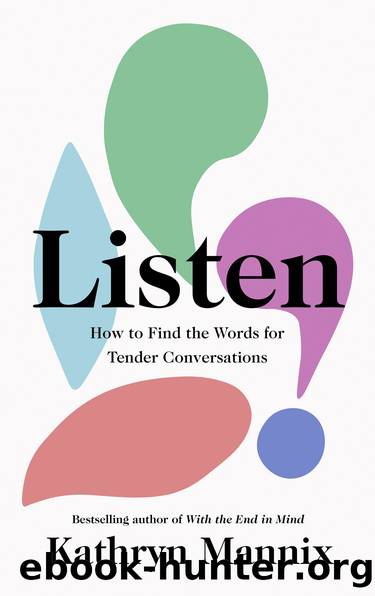Listen by Kathryn Mannix

Author:Kathryn Mannix [Mannix, Kathryn]
Language: eng
Format: epub
Publisher: HarperCollins Publishers
Published: 2021-08-03T12:00:00+00:00
Anger
Anger is about unmet expectations. It is an alarm response generated by a gap between what is happening and what someone believes should be happening: a perceived lack of fairness, a breaking of the rules, whether explicit or unspoken. Discussion while one or both parties is feeling angry can make the conversation difficult, and anger can turn a conversation into a confrontation. How best can we navigate discussions when anger is also present?
Iâm sitting in an oak-panelled room high above the gardens of the Victorian part of our hospital. The windows are open to cool the air: itâs high spring, and a bee buzzes heavily through the room and exits via another window towards the top branches of a heavy-scented magnolia tree beyond. Sitting with me are the complaints manager, Enid, and a retired, eminent professor of surgery, and we are preparing to meet the unhappy family of a patient who has died in the care of our hospital.
We are spaced out around a long, polished conference table. There is a water jug and a collection of glasses on the table, a box of tissues and a tape recorder with a grey microphone. There is an atmosphere of quiet contemplation. The calm before the storm.
Prof Price was a senior surgeon in this organisation for many years. He taught me as a medical student. I found him terrifying. Since retirement he has taken on a conflict-resolution role, and it has been an education for me, as the hospitalâs end-of-life care lead, to see him in action. The fiery young surgeon I used to fear has been transformed by his life experiences into a wise elder. It is not his glittering career but the challenges, bereavements and personal losses he has weathered that have turned his passion to patience; his once-famous temper has been reduced to a spark that ignites at injustice. When he talks to people making a complaint about care, his palpable sense of their right to fairness sets them at their ease. He can sit with other peopleâs anger and acknowledge their right to feel it. Equally, he brooks no unjustified criticism of the intentions of staff to deliver an excellent service: his is a court of polite listening, generous empathy and clear rules of fairness.
Enid has provided us with bundles of paper: copies of case notes, nursing notes, drug charts, letters from the family, responses from the hospitalâs senior team. It is all depressingly familiar: an elderly man, beloved of his family, was admitted to hospital for something that seemed routine. In hospital it became clear that he was very much sicker than anyone had previously realised. His surgical procedure went smoothly, but his background health deteriorated and he died before he could get home. His family perceives that, since he was ânot too badâ when he came into hospital, his subsequent deterioration and death must be someoneâs fault, and that the hospital is failing to tell the truth. Furthermore, on the night before he died, the patient became muddled and called home to say the staff were threatening to kill him.
Download
This site does not store any files on its server. We only index and link to content provided by other sites. Please contact the content providers to delete copyright contents if any and email us, we'll remove relevant links or contents immediately.
Harry Potter and the Goblet Of Fire by J.K. Rowling(3048)
Unfinished: A Memoir by Priyanka Chopra Jonas(2918)
Never by Ken Follett(2886)
The Man Who Died Twice by Richard Osman(2301)
Machine Learning at Scale with H2O by Gregory Keys | David Whiting(2294)
Fairy Tale by Stephen King(2073)
Will by Will Smith(2044)
Rationality by Steven Pinker(1768)
The Storyteller by Dave Grohl(1662)
The Dawn of Everything: A New History of Humanity by David Graeber & David Wengrow(1571)
The Dark Hours by Michael Connelly(1571)
The Stranger in the Lifeboat by Mitch Albom(1533)
Cloud Cuckoo Land by Anthony Doerr(1439)
Friends, Lovers, and the Big Terrible Thing by Matthew Perry(1332)
The Becoming by Nora Roberts(1331)
New Morning Mercies: A Daily Gospel Devotional by Paul David Tripp(1330)
Crying in H Mart by Michelle Zauner(1316)
Einstein: His Life and Universe by Walter Isaacson(1315)
A Short History of War by Jeremy Black(1300)
